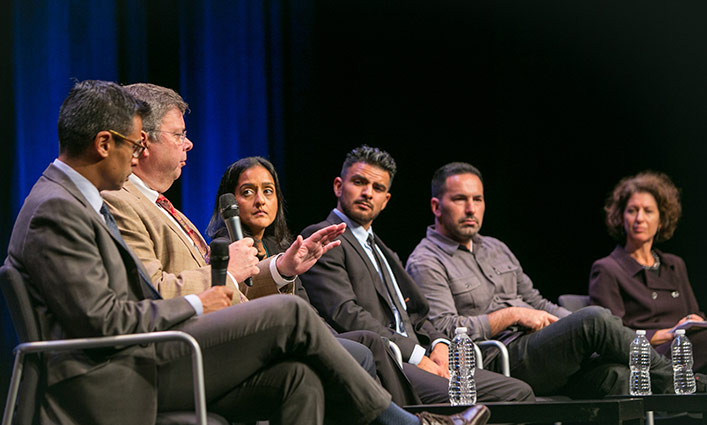
On October 10 and 11, John Jay College, in partnership with the Center for American Progress and the Draper Richards Kaplan Foundation, hosted the first Smart on Crime conference, bringing together a diverse group of bipartisan elected officials, researchers, non-profit advocates, and other national leaders to discuss criminal justice reform. Among the speakers invited were former U.S. Attorney General Eric Holder, U.S. Senator for New Jersey Cory Booker, John Jay Professor David Kennedy, and more.
“A pursuit of justice with different voices has power," said John Jay President Karol V. Mason. "We’re here to work with unlikely partners and make new allies so we can move forward.”
Given that the U.S. has higher incarceration rates than any country in the world and there is little evidence to suggest that an increase in prisons has resulted in reduced crime rates, the conference’s aim was to create a discussion about justice solutions that actually work, as well as those that don’t.
“Mass incarceration is driven by ideology and is inconsistent with evidence,” said former U.S. Attorney General Eric Holder. “It is a cookie-cutter approach to crime that’s been discredited, and does little to achieve public safety."
Speakers agreed that our current approach to criminal justice is also fiscally irresponsible. “It’s impoverishing our society,” said Mark Holden, Senior Vice President of Koch Brothers. "We invest more in incarceration than education, and as a result, more Americans have criminal records than college degrees."
But just as important as a data-driven, evidence-based justice approach is one that is also informed by human narrative and empathy.
“Being able to move what people believe about incarceration is a critical piece,” said Nicholas Turner, President of the Vera Institute. His remarks reinforced those made by Daryl Atkinson, co-director of Forward Justice, calling for the elimination of stigma against incarcerated people and the importance of centering incarcerated peoples’ voices.
Eradicating prejudice and implicit bias from law enforcement towards communities of color is another important part of this shift towards empathy.
“It’s not us versus them,” said Vanita Gupta, President and CEO of the Leadership Conference. “Police chiefs around the U.S. understand that officers on the street need the trust of the community.”
Many speakers pointed out that in addition to policing, other places for reform include mandatory sentencing, lack of satisfactory defense counsel for the accused, and pre-trial incarceration, all of which have contributed to the staggering result that nearly one-third of working age adults has a criminal record.
“We've been under the perception that being tough on crime is helping us lead safer lives but that's not what's happening,” said Shakyra Diaz, Managing Director at the Alliance for Safety and Justice.
In reality, certain pockets of communities continue to live with the devastating impact of crime.
“There are communities all over the country, especially young men of color, who are experiencing persistent homicide rates,” said David Kennedy, Professor and Director of the National Network for Safe Communities at John Jay College.
Reducing crime in a way that is both rehabilitative and effective is something that several leaders think can be done by focusing less on prosecution, and more on prevention. “We need to be less punitive and focus on big issues,” said Cyrus Vance, Manhattan District Attorney. “Prevention can make crime reduction possible.”
These prevention strategies include education, mental health opportunities, and equal employment. But dismantling prisons and reducing prison sentences in place of preventative efforts can be difficult for a variety of reasons.
“Certain corporate interests profit off the current system,” said Rashad Robinson, Executive Director of Color of Change, in reference to national companies that lobby to keep regressive criminal justice practices in place.
Complicating matters is that private prisons are often the key drivers of local economies across the US. “For decades we have been building prisons in communities where there are no jobs,” said Alphonso David, counsel to Governor Andrew Cuomo. “When you close down those prisons, you get a substantial amount of opposition.”
Still, advocates think that bringing public attention to the scale of devastation caused by mass incarceration, some of which has been spearheaded by the Black Lives Matter movement, can lead to justice reform.
“People are seeing there’s something terribly wrong with our system,” said Shaila Dewan, a journalist with The New York Times. “We can no longer look at criminals as the other. Americans are saying wait a minute.”
In an armchair discussion with JustLeadershipUSA President Glenn E. Martin, New Jersey Senator Cory Booker agreed that while the work of all of the leaders who spoke as part of the Smart on Crime Conference is essential to creating change, what is needed is nationwide outrage.
“The biggest threat to our democracy is the system of mass incarceration,” Booker said. “What I’ve learned is that if you look at major changes, it needs to come from people demanding it. We all need to be activists. We should all be engaged.”



